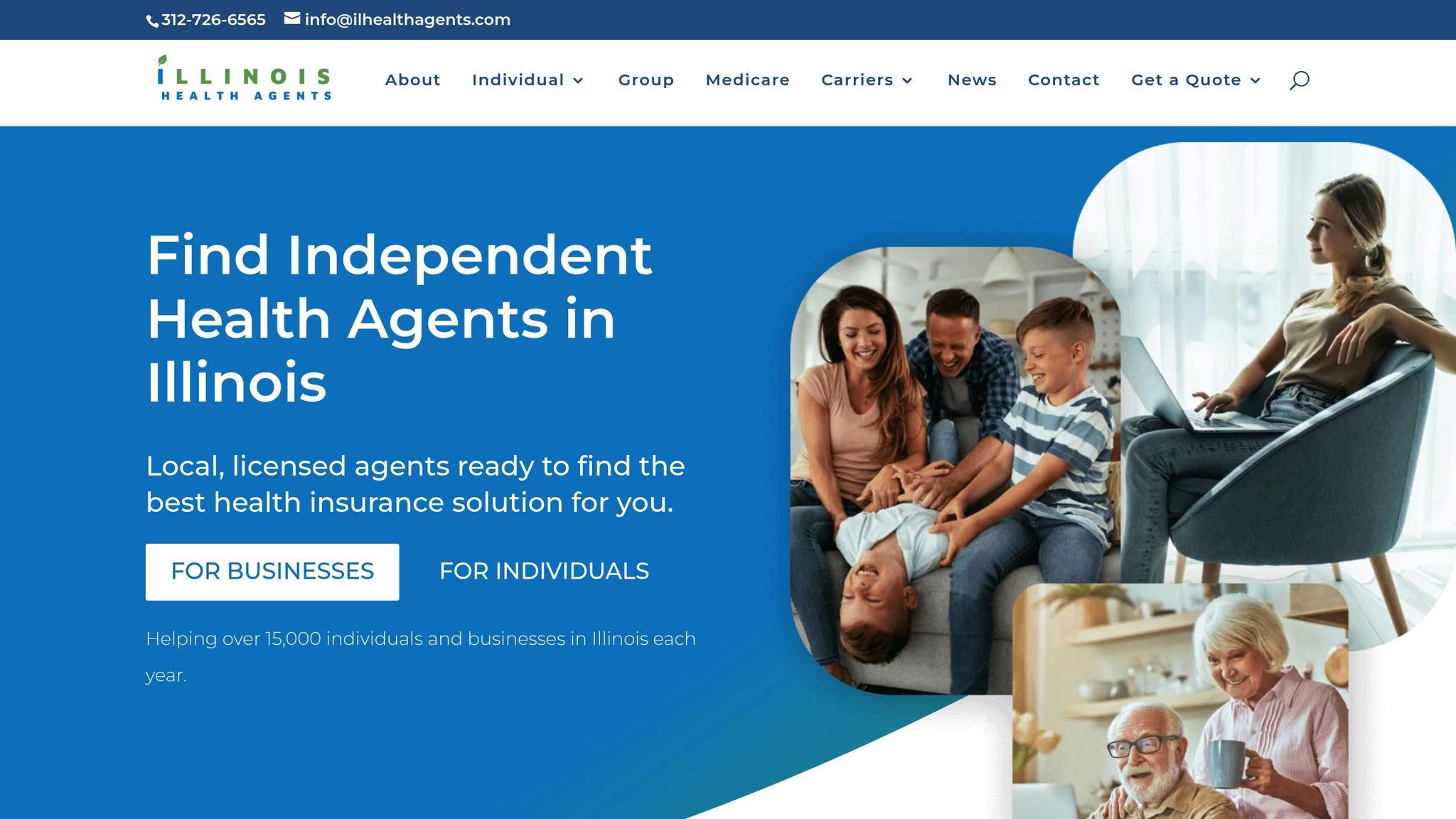Brokers play a critical role in helping businesses manage group health insurance costs. They negotiate with insurance carriers to secure lower premiums and better coverage options by leveraging factors like group size, claims history, and market competition. Here’s what you need to know:
- Cost Control: Brokers work to reduce premiums without sacrificing coverage quality, helping businesses reinvest savings or improve employee benefits.
- Customization: They tailor plans to meet workforce needs, adjusting deductibles or adding wellness programs.
- Preparation: Brokers gather detailed data (e.g., employee demographics, claims history) to strengthen their negotiation position.
- Market Expertise: By comparing rates and aligning negotiations with market trends, brokers ensure competitive pricing.
- Local Advantage: In states like Illinois, brokers with regional expertise can access better rates and plans from local carriers.
Effective negotiation requires preparation, data analysis, and clear priorities. Businesses that partner with skilled brokers can save money and provide better employee benefits.
Group Health Rate Negotiation Basics
What Are Group Health Insurance Rates?
Group health insurance rates refer to the monthly premiums employers pay to provide health coverage for their employees and, in many cases, their employees’ families. Unlike individual health plans, which are priced based on personal factors like age or medical history, group plans spread risk across the entire workforce. This pooling approach often results in more consistent and, in many cases, lower per-person costs.
Several factors influence how these rates are calculated. For instance, group demographics – such as the average age, gender distribution, and location of employees – play a major role. Younger employee groups typically see lower premiums, while older workforces may face higher costs. Insurers also examine the group’s claims history to predict future medical expenses. If the group has a history of higher medical claims, the renewal rates may reflect that increased risk. Additionally, the nature of the business itself can impact premiums. Companies in industries with higher health risks or more physically demanding jobs often pay more.
Understanding these basics lays the groundwork for effective rate negotiation, especially when brokers step in to navigate the process.
How Brokers Help with Rate Negotiation
Brokers act as a bridge between employers and insurance providers, using their market expertise and industry connections to secure better rates and coverage options. Their access to multiple insurance carriers allows them to compare proposals and present businesses with competitive options that might not be available otherwise.
To strengthen negotiations, brokers gather detailed information, such as employee census data, claims history, and participation rates. By highlighting the group’s positive attributes and addressing potential concerns, they position the employer as a favorable client. Timing is also key – brokers strategically align negotiations with renewal periods and market conditions to maximize leverage. This combination of data-driven insights and market savvy gives businesses an edge in negotiating group health insurance rates.
How Insurance Companies Set Rates
Insurance companies rely on a structured underwriting process to determine group health insurance rates. They analyze various factors, including employee census data (age, gender, location, and family size) and the overall size of the group. Smaller groups may require additional medical information, while larger groups often benefit from community rating, which spreads costs across a broader pool.
In addition to demographics, insurers review historical claims data to assess potential future costs. They also account for administrative expenses, competition within the market, and compliance with regulatory requirements when finalizing rates. This thorough evaluation ensures that premiums reflect both the group’s risk profile and broader market conditions.
Employers should be skeptical of a "no bid" health plan renewal
Preparing for Negotiations with Insurance Companies
Getting ready for negotiations with insurance companies is all about laying the groundwork. The effort you put in beforehand can make the difference between settling for standard rates and securing better terms. To prepare effectively, focus on gathering key data, comparing market rates, and setting clear priorities for your plan.
Collecting Group Data and Usage Information
Start with accurate and detailed group data. This includes employee demographics, claims history, and usage patterns. Presenting this information can strengthen your position by showcasing why your group deserves better terms. For example, if your group consistently has low claims because employees primarily use preventive care rather than expensive emergency services, that low-risk profile can work in your favor.
Highlight factors that demonstrate a well-managed group, such as high participation rates (75% or more) and wellness programs. These details emphasize your group’s commitment to managing costs and overall health.
Additionally, review prescription drug usage. If your employees lean toward generic medications or show low usage of specialty drugs, this can support your case for reduced pharmacy costs – another strong point when negotiating.
Comparing Market Rates
Benchmarking is a powerful tool. By comparing your rates to similar groups in your industry and region, you can identify whether you’re paying more than you should and use that data to push for better pricing.
For example, groups in metropolitan areas like Chicago might face different pricing compared to smaller cities in Illinois. Similarly, industry-specific factors – such as a younger workforce or lower overall risk – can influence rates. Understanding these differences allows you to make a stronger case.
Pay attention to renewal trends, too. If the market shows modest rate increases while your group faces steeper hikes, you’ll have solid evidence to challenge those higher costs. Also, examine provider networks – if similar groups are getting comparable networks at lower prices, that’s another point to bring to the table.
Setting Plan Goals and Priorities
Clear goals are essential for effective negotiations. Without them, discussions can lose focus, leading to compromises that may not meet your needs. After reviewing market trends, define your objectives and prioritize them.
For cost control, set measurable targets. Instead of vaguely aiming for "lower rates", decide on specific goals, like limiting rate increases to a certain percentage or achieving a target per-employee monthly cost.
Coverage priorities should align with your workforce’s needs. For example, older employees might value robust prescription drug coverage, while younger workers may prioritize mental health services or telehealth options. Employee retention is another key factor – if your current plan is popular and helps with recruitment, keeping familiar benefits might outweigh small cost savings. On the other hand, if employees are dissatisfied, negotiations can be a chance to improve the plan.
"To ensure that the ‘product’ aligns with both parties’ strategic goals, negotiators must maintain clarity about their non-negotiables and areas where flexibility exists. This clarity, stemming from the ‘preparation’ phase, plays a pivotal role in shaping negotiations towards a satisfactory ‘product.’"
- Shipsigma
Before negotiations start, identify deal-breakers versus flexible points. For instance, keeping access to a specific provider network might be non-negotiable, while you might be open to adjusting deductible amounts. Also, set clear timeline expectations, like a specific coverage start date, to keep the process on track.
Key Negotiation Strategies Brokers Use
After gathering your data and defining your goals, it’s time to put tried-and-true negotiation tactics into play. Skilled brokers rely on strategies like highlighting your group’s strengths, fostering competition among insurance carriers, and fine-tuning plan designs. These approaches build on your preparation, paving the way for targeted and competitive discussions.
Highlighting Group Size and Risk Profile
A group’s characteristics can be its biggest bargaining chip. Larger groups often secure better rates because they spread risk across more members. On the other hand, smaller groups can still negotiate effectively if they demonstrate a healthy workforce or high participation in wellness programs.
Brokers often use industry benchmarks to show how your group compares to lower-risk sectors like technology, professional services, or education. The goal is to present your group in a way that reassures insurers about reduced risk, which can lead to more favorable terms.
Seeking Quotes from Multiple Carriers
Reaching out to several insurance companies well in advance of your renewal date is key to sparking competition. By starting the quoting process months ahead, brokers ensure there’s enough time for carriers to submit competitive bids.
In states like Illinois, regional carriers often challenge the pricing of larger national companies, offering opportunities for better rates. Brokers also align negotiations with insurers’ sales cycles or financial deadlines, such as quarter-end or fiscal-year close, when carriers may be more willing to negotiate to hit their targets.
Adjusting Plan Design to Cut Costs
In addition to leveraging your group’s profile and creating market competition, tweaking the plan design can provide even more negotiating power. Adjustments can reduce costs without sacrificing essential benefits.
For instance, brokers often explore scenarios where raising deductibles leads to premium savings while keeping out-of-pocket costs manageable. Narrowing provider networks to focus on the most-used facilities and doctors can also help control costs without compromising care quality.
Prescription drug plans are another area ripe for cost savings. Encouraging lower-cost alternatives or implementing step-therapy protocols can significantly cut expenses. Wellness programs, like biometric screenings, not only lower rates but also improve employee health over time.
Other strategies include creative cost-sharing adjustments, such as varying copays for primary care versus specialist visits or restructuring emergency and urgent care costs. By focusing on the total cost of plan ownership, brokers craft solutions that balance affordable premiums with long-term value for employees.
sbb-itb-a729c26
5-Step Process for Negotiating Group Health Rates
Brokers follow a structured approach to secure competitive group health insurance rates, moving from data collection to plan implementation. Here’s how the process unfolds:
Step 1: Collect and Review Data
The first step is gathering key historical information. Brokers analyze claims history, utilization patterns, and demographic and financial data. This groundwork helps paint a clear picture of the group’s risk profile and cost structure, setting the stage for informed decision-making and identifying areas that could benefit from adjustments.
Step 2: Create a Competitive Proposal
With the data in hand, brokers craft a detailed Request for Proposal (RFP) that outlines the group’s specific needs, characteristics, and strengths. A well-prepared RFP not only highlights the group’s requirements but also encourages carriers to submit tailored and competitive offers, creating a solid foundation for evaluation.
Step 3: Review and Compare Insurance Company Offers
Once carriers respond, brokers carefully evaluate the proposals. The focus isn’t just on premium costs – brokers also assess coverage options, service quality, and the overall value each plan offers. This in-depth comparison ensures the chosen plan meets the group’s broader needs, not just its budget.
Step 4: Meet with Insurance Companies
Brokers then meet with insurance representatives to discuss the proposals in detail. These meetings provide an opportunity to clarify terms, address any uncertainties, and negotiate adjustments. This open communication ensures all parties are aligned on expectations and sets the stage for a plan that benefits everyone involved.
Step 5: Finalize and Implement the Plan
After negotiations are complete, brokers finalize the agreement, put the plan into action, and monitor its performance. This ongoing evaluation helps inform future negotiations and ensures the plan continues to meet the group’s needs effectively.
Benefits of Local Expertise for Illinois Businesses
When it comes to negotiating group health insurance, having a local edge makes all the difference – especially for businesses in Illinois. Brokers with a deep understanding of Illinois-specific conditions can secure better rates and tailor plans to fit the unique needs of businesses in the state. This local expertise shapes every step of the negotiation process, giving Illinois businesses a significant advantage.
Access to Regional Insurance Companies and Plans
Illinois-based brokers have direct relationships with regional insurance carriers, opening the door to better pricing and tailored plan options. These regional carriers are well-versed in Illinois-specific regulations and market conditions, enabling them to offer plans that align closely with local needs. In contrast, national brokers might lack access to these specialized options.
Local brokers also keep a close eye on healthcare trends and regulatory changes that directly impact Illinois businesses. For example, they understand how factors like Chicago’s higher cost of living, healthcare access disparities between suburban and rural areas, and state-mandated coverage requirements influence plan structures and pricing. Armed with this knowledge, they can present your business’s needs in a way that resonates with regional carriers, leading to more favorable terms.
Timing is another key advantage. Illinois brokers know when local carriers roll out new products, adjust rates, or introduce special programs. This insider knowledge allows them to strategically time negotiations, ensuring businesses can seize opportunities that might be missed by out-of-state brokers.
How Illinois Health Agents Can Help

Illinois Health Agents takes full advantage of these regional benefits to deliver tailored solutions for businesses across the state. With strong relationships with top Illinois carriers and a deep understanding of the local market – including the Chicago metro area – they are well-positioned to identify the best options for your unique needs.
Their personalized approach ensures that every aspect of your business is considered, from employee demographics to budget constraints. By thoroughly preparing before negotiations, they can present a compelling case to carriers, maximizing your chances of securing better rates and terms.
Beyond the negotiation table, Illinois Health Agents provides ongoing support to simplify the entire process. They handle the heavy lifting, from paperwork to meetings, and make complex insurance details easier to understand. Their local presence means they’re available for in-person meetings and can quickly address any questions or concerns that arise.
Illinois Health Agents also offers a wide range of insurance solutions, including group health, vision, dental, and supplemental coverage. This comprehensive access allows them to negotiate bundled rates, often leading to cost savings. With competitive service fees, even small businesses can benefit from their expertise, making the entire process smoother and more effective.
Key Points for Successful Group Health Rate Negotiations
Negotiating group health rates isn’t just about sitting at the table and hoping for the best. It’s about preparation, strategy, and working with the right broker to get the results you need. Businesses that actively engage in the process tend to see better outcomes than those that take a backseat.
Preparation sets the foundation. Before negotiations even start, businesses should establish their cost structure, coverage priorities, and acceptable rate ranges. This groundwork gives direction to the entire process and helps brokers build stronger cases when presenting to carriers. Using market data to compare rates and plan options is also essential – it allows businesses to understand where they stand in the competitive landscape.
Transparency matters. One of the biggest challenges for businesses, especially those with fully insured plans, is the lack of visibility into claims data. Partnering with a benefits advisor who can provide detailed claims insights makes a huge difference. It lets companies see exactly how their money is being spent, enabling smarter decisions. For self-funded plans, analyzing provider costs and employee usage trends can help adjust plans proactively.
Not all brokers are created equal. Some brokers focus more on maintaining their relationships with large carriers than on advocating for their clients. These advisors may offer little beyond annual renewals. On the other hand, brokers who work year-round to identify cost-saving opportunities and deeply understand the marketplace can negotiate terms that truly align with a company’s needs. Their expertise and dedication often lead to better outcomes.
Timing and education make a difference. Knowing when carriers roll out new products or adjust rates can give businesses an edge. At the same time, internal stakeholders – like HR and finance leaders – need to be informed about cost trends and potential outcomes. This knowledge ensures they can support brokers effectively during the negotiation process.
Finally, working with local experts can add another layer of advantage, thanks to their relationships with regional carriers and their understanding of state-specific regulations, as noted previously.
In short, successful negotiations depend on preparation, transparency, and having a broker who’s genuinely committed to your goals.
FAQs
How can a business tell if their group health insurance rates are competitive?
To see if your group health insurance rates are in line with what others are paying, stack them up against industry standards, regional averages, and what businesses of a similar size are charged. Pay close attention to factors like monthly premiums, plan benefits, and the makeup of your workforce.
It’s also worth taking a look at market trends and considering how much leverage your insurance provider has during negotiations. Working with a professional broker, such as Illinois Health Agents, can give you helpful insights and ensure you’re securing the most competitive rates for your coverage.
What information should a business gather to negotiate better group health insurance rates?
To secure better group health insurance rates, businesses should prioritize gathering key information that paints a clear picture of their workforce and coverage requirements. Here’s what to focus on:
- Claims history and trends: Look at past claims to spot patterns and pinpoint what’s driving costs.
- Employee demographics: Collect details like age, gender, and general health conditions to help insurers assess risk more accurately.
- Plan usage and costs: Evaluate how employees are using the current benefits, including any high-cost claims or services that are rarely used.
- Industry benchmarks: Compare your data with similar businesses to highlight your competitiveness and support rate adjustments.
Having this data at hand not only strengthens your case during negotiations but also enables brokers, like Illinois Health Agents, to push for customized, cost-effective plans that align with your business’s needs.
How can a local Illinois broker help secure better group health insurance rates?
When it comes to securing group health insurance in Illinois, working with a local health insurance broker offers distinct benefits. These brokers have a deep understanding of the Illinois market and strong connections with regional insurance carriers, which puts them in a great position to negotiate competitive rates and customize coverage options.
Their local expertise allows them to spot cost-saving opportunities and tailor plans to meet the unique needs of businesses. This hands-on, personalized approach often leads to more favorable terms and broader coverage than what might be achieved with brokers who lack insight into the local market.



0 Comments